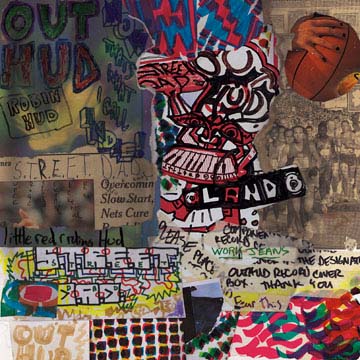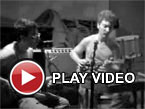Out Hud, "Street Dad"
 When I first saw Out Hud, they were playing to a crowd of Chicago's finest at the Fireside Bowl in the midst of an old-fashioned Midwestern heat wave. Two feelings prevailed that night, as the crowd anxiously awaited the headlining Locust to come on: the first was the "my god, I could not be more sweaty in this sauna of a club appropriately named the fireside" feeling. The second was the "I don't know who this band Out Hud is or why they are playing this show, but I guess it's cool" feeling. This second sentiment was actually voiced by Out Hud bassist (and !!! vocalist) Nic Offer himself in the banter between two songs. All the perspiring punks could have cared less why Out Hud were there; what mattered was that they were in fact there, and for a 40-minute set on a night when movement was excruciating, everyone forgot about the oppressive heat and started to dance and move and shake to this strange band whose music demanded that our bodies dance and move and shake, regardless of whether we wanted to or not.
When I first saw Out Hud, they were playing to a crowd of Chicago's finest at the Fireside Bowl in the midst of an old-fashioned Midwestern heat wave. Two feelings prevailed that night, as the crowd anxiously awaited the headlining Locust to come on: the first was the "my god, I could not be more sweaty in this sauna of a club appropriately named the fireside" feeling. The second was the "I don't know who this band Out Hud is or why they are playing this show, but I guess it's cool" feeling. This second sentiment was actually voiced by Out Hud bassist (and !!! vocalist) Nic Offer himself in the banter between two songs. All the perspiring punks could have cared less why Out Hud were there; what mattered was that they were in fact there, and for a 40-minute set on a night when movement was excruciating, everyone forgot about the oppressive heat and started to dance and move and shake to this strange band whose music demanded that our bodies dance and move and shake, regardless of whether we wanted to or not.
'Street Dad' aspires to do just that. Since it is both Out Hud's first full-length and their label premier for Kranky, 'Street Dad' will likely introduce a lot of folks to their music, which many critics see as the not-quite-natural result of ESG breeding with Gang of Four and the offspring being adopted by the two well-meaning parents of Soft Machine and King Tubby and allowed to see its six Factory Records cousins on holidays. The premise of the music is simple: dance beats decorated with heavy fringes of rock and electronic music. While this formula sounds like a bland concoction that every musical alchemist is trying to perfect these days, Out Hud are able to make it work. Part of the band's success is due to the reliance on actually playing instruments rather than pumping sound samples in from a mixer (though Justin Vandervolgen handily manages the mixing board for the band, it is not over-utilized).
"The Story of the Whole Thing" is a moderately-paced opening song which drones pleasantly until giving way at the end to a dawn-breaking call and response between Tyler Pope's guitar and what sounds like a rather delighted and rhythmic humpback whale (actually, it's Molly Schnict's cello). The centerpiece of the album, though, is its second song, titled "Dad, There's a Little Phrase Called Too Much Information." This song features about four distinct and lovely parts, shimmering with guitar but plodding onwards with heavy bass and drum beats which sternly coax you into movement. Between the themes there are punctuations of Out Hud's trademark two-second cacophony, a resonating blast of electronic feedback that seems to pop up in the majority of the band's songs. These little explosions remind you that despite the seeming control and mastery with which the band handles the music, there is such a thing as chaos and ataxia in Out Hud's music. This hinted-at entropy is perhaps the reason why their sound is so compelling, as the band brings you desperately close to some arrhythmic brink of destruction, only to draw you instantly back in, cuddled safely once again in the bosom of their groove. The feeling is both infantilizing and exhilarating.
samples:
- Dad, There's a Little Phrase Called Too Much Information
- Hair Dude, You're Stepping On My Mystique
- This Bum's Paid
 



